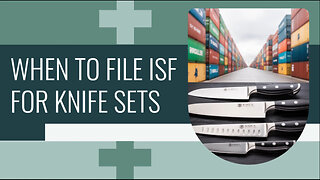Premium Only Content

Navigating ISF and Customs Brokerage: Ensuring Smooth International Trade
License To Import // 323-578-6432 // file@licensetoimport.com // www.licensetoimport.com
This response delves into the concepts of customs brokerage, Importer Security Filing (ISF), and the responsibilities of importers in maintaining a smooth international trade process. It emphasizes the role of customs brokers as intermediaries between importers and government authorities, ensuring adherence to customs regulations and facilitating the clearance of goods. The Importer Security Filing (ISF) requirement, also known as the 10+2 rule, is explained, highlighting the 10 data elements that importers must submit to the U.S. Customs and Border Protection (CBP) prior to the arrival of goods. The importance of working closely with a customs broker to comply with ISF requirements and avoid penalties and delays is emphasized. The significance of customs bonds in ensuring compliance with customs regulations and payment of duties and taxes is also explored, with a focus on the types of bonds available and the assistance provided by customs brokers in obtaining them. The response concludes by highlighting the intrinsic value of understanding importers' responsibilities in the customs clearance process and collaborating with knowledgeable customs brokers.
#usimportbond #isfcustomsbroker #uscustomsclearing #isfentry
Video Disclaimer Here: This video is solely for education and is not endorsed by any US government agency.
00:22 - Customs Brokerage: Customs brokers specialize in facilitating the clearance of goods through customs by acting as a liaison between importers and government authorities. They are well-versed in complex regulations and play a critical role in helping importers navigate the customs clearance process.
00:51 - ISF (Importer Security Filing): The ISF, also known as the 10+2 rule, is a requirement imposed by U.S. Customs and Border Protection on importers to enhance supply chain security. Importers must submit 10 data elements to CBP at least 24 hours before goods are loaded onto a vessel destined for the United States.
02:21 - Customs Bond: Importers are required to obtain a customs bond before importing goods into the United States. This financial guarantee ensures compliance with customs regulations and payment of duties and taxes. There are two types of customs bonds: single-entry bond and continuous bond, each covering different import transactions.
-
 1:39
1:39
License To Import
15 days agoWhen To File ISF For Knife Sets
9 -
 1:38:52
1:38:52
Michael Franzese
19 hours agoEpstein. Diddy. Coverups. What the Government Isn’t Telling You
73.5K173 -
 LIVE
LIVE
SilverFox
5 hours ago🔴LIVE - Elden Ring - Stream Doesn't End Until We Beat The Game
96 watching -
 LIVE
LIVE
WorldofGaming
17 hours agoMario Party Unleashes the Madness!
32 watching -
 2:23:40
2:23:40
Robert Gouveia
9 hours agoObama Traitors get CRIMINAL REFERRAL! Motion to UNSEAL! Rupert Murdoch SUED!
61.8K125 -
 LIVE
LIVE
Brockstrap55
1 hour agoPokeMMO! Rocket Radio Tower.
10 watching -
 LIVE
LIVE
CassaiyanGaming
6 hours agoThe Quarry | Saturday at NOOOOOOOOOOOOOON
132 watching -
 LIVE
LIVE
Biscotti-B23
4 hours ago $0.60 earned🔴 LIVE TOP 30 RANK 🏆 WHY IS THIS GAME SO FUN BUT SO TRASH? ❌ HUNTER X HUNTER: NEN IMPACT
56 watching -

GamingWithHemp
4 hours agoDonkey Kong Bananza episode #2
12.3K1 -
 4:05:57
4:05:57
MadHouseRetro
5 hours agoMadhouse Presents : Kingdom Hearts Series. Pt. 1, Beaches and sunsets.
9.57K